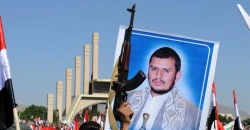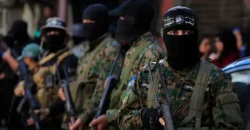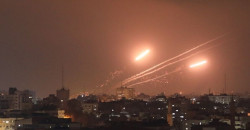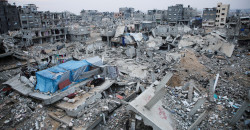Rocket attack on Israel by Iran or allies imminent, US and Israeli intelligence warn
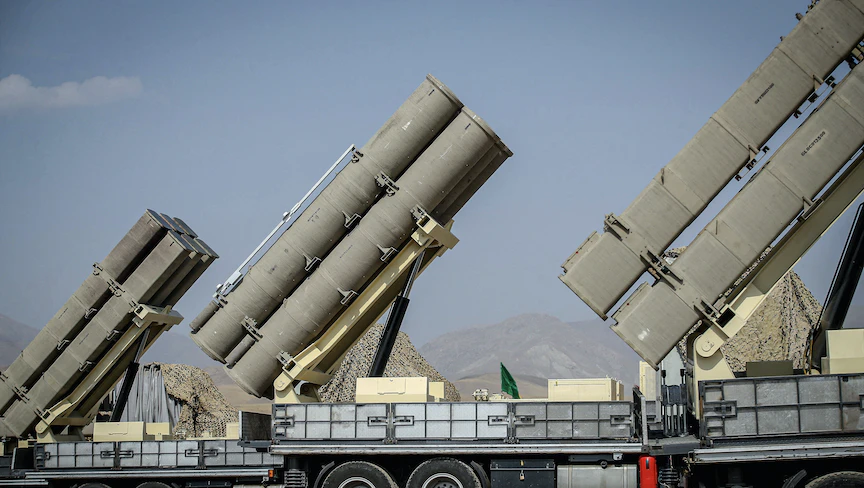
Shafaq News/ American media reported on Thursday that a rocket attack on Israel, potentially orchestrated by Iran or its affiliated groups, is looming soon after Tehran's threat to retaliate for the killing of Iranian generals on April 1 in an airstrike on its embassy in Damascus.
The attack resulted in the killing of Brig-Gen Mohaeémmad Reza Zahedi, a leader in the Quds Force of the Islamic Revolutionary Guard Corps (IRGC), along with his deputy and 11 others.
Informed sources within US and Israeli intelligence circles told Bloomberg that the targeting will possibly employ precision-guided missiles and will occur within days.
The sources, speaking on condition of anonymity, reported that the United States and its allies are closely monitoring the situation, anticipating potential rocket strikes or drone attacks targeting military and government installations in Israel.
The intelligence also indicated that the intended targets are primarily military and government facilities, with assurances that civilian areas would not be targeted deliberately.
Bloomberg reported that the Iranian attack does not exclusively point to an escalation on the northern front (with Lebanon.)
In response to the attack on the Iranian consulate, Iranian officials pledged a decisive response to what they labeled a "crime," reaffirming their commitment to retaliate at the appropriate time and place.
On Wednesday, Iranian Supreme Leader Ayatollah Ali Khamenei renewed his threat to punish Israel for attacking the Iranian consulate compound in Syria.
Speaking at the Eid al-Fitr occasion, the Iranian top leader said, "The evil regime made a mistake and must be punished, and it will be punished."
He stated, "Consulates and embassies are considered sovereign territories of the countries they represent, so when they attacked the consulate, it was tantamount to attacking our own sovereign land."
Last week, Sayyid Khamenei warned Israel that it would regret its actions following the bombing of the Iranian consulate in Damascus.
Khamenei posted on X platform in Hebrew, declaring that Israel "will regret, God willing, its aggression against the Iranian consulate in Damascus."
In another post, Khamenei declared that Israel "will receive a slap" for its attack in Syria.
Major General Mohammad Bagheri, Chief of Staff of the Iranian Armed Forces, strongly condemned the recent attack, confirming that "The enemy will be disappointed by brave Iranian men."
Brigadier General Ahmad Khadem Seyed al-Shohada, the commander of IRGC's regional HQ in Southwestern Iran ("Karbala" HQ), said, "According to the statements of the Supreme Leader of the Islamic Revolution, the era of knocking on the door is over, and we will respond overwhelmingly to the usurping Zionist Israel, and this word has shaken the enemies' entity."
Khadem Seyed al-Shohada said, "The fake Zionist regime resorted to its trenches out of fear, but the terror of the Iranian Revolutionary Guard missiles is more worrisome for them than death."
The Islamic Republic has not yet disclosed the planned operation or details of its timing.
Media reports in Israel indicated that Tel Aviv is bolstering security measures in anticipation of Iran's response to the consulate strike.
Israeli Security Minister Yoav Gallant's office stated Israel's readiness following his "operational situation assessment" with senior military officers.
"Upon completing the assessment, Minister Gallant emphasized that the defense establishment has completed preparations for responses in the event of any scenario that may develop vis-à-vis Iran," the statement read.
In turn, Chief of General Staff Herzi Halevi asserted Israel's capability to deal with Iran both offensively and defensively.
"We know how to act forcefully against Iran in both near and distant places. We are operating in cooperation with the USA and strategic partners in the region," he said in televised remarks.
Navigational signals were scrambled over the Tel Aviv metropolitan area last week as Israel braced for a potential Iranian attack on the economic center, causing disruptions in traffic, food delivery, and transportation applications.
Tel Aviv residents reported unusual discrepancies in their smartphone maps, with some apps showing them in Beirut, Lebanon.
"I took a 6-minute trip on a rental scooter in Tel Aviv and the app thinks I traveled 200km to Beirut," one resident in Israel wrote on social media.
The measures are believed to have been taken by Israeli officials to disrupt GPS-navigated drones or missiles that Iran or its proxies, mainly Lebanon's Hezbollah, might target.
Last week, an American official confirmed that the United States is on "extreme alert" and preparing for a potential Iranian attack targeting Israeli or American assets in the region in response to an Israeli strike that resulted in the killing of an Iranian military commander in Syria.
President Joe Biden discussed the threat posed by Iran in a phone call with Israeli Prime Minister Benjamin Netanyahu. A senior official in the Biden administration mentioned that "our teams have been in regular and continuous contact since then. The United States fully supports Israel in confronting threats from Iran."
Israeli media outlets have outlined potential scenarios in response to the assassination of Zahedi, anticipating what they term "Iranian revenge."
Haaretz newspaper enumerated four possible scenarios for Iranian retaliation. First, Iran may opt for a calculated response, biding its time to select a symbolic and impactful target, considering the political and reputational ramifications post-Israeli strikes.
Alternatively, a swift and proportional reaction targeting ships, embassies, or Israeli personnel abroad could unfold, potentially escalating tensions.
A more drastic scenario involves Iran leveraging Hezbollah in Lebanon, opening a dangerous second front that could escalate into a broader conflict.
The most extreme scenario envisions Iran venting fury not only on significant Israeli but also American targets in the Gulf.
According to Iranian media, Israel has assassinated 18 IRGC members, including prominent military leaders, from December 2, 2023, to April 2, 2024.
